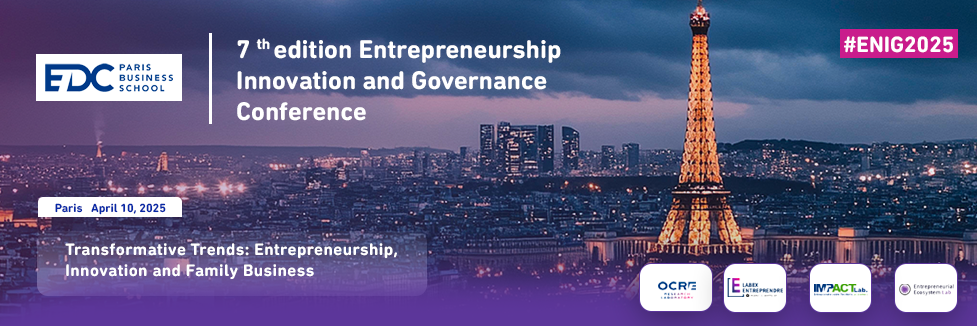
Call for papersENIG 2025 (Download) 7th Edition of Entrepreneurship Innovation and Governance Conference Transformative Trends: Entrepreneurship, Innovation, and Family Business in a Changing World EDC Paris Business School April 10, 2025
The global economy is facing profound changes in recent years, driven by the acceleration of digital transformation, the multiplication of geopolitical crises, and societal and environmental mutations (Ahlstroma et al, 2020). Entrepreneurs, SMEs, and large family businesses must adopt new strategies to stay competitive and resilient. How companies adapt to these changes is key to understanding the future of entrepreneurship. Digital transformation is the process of introducing new technologies within organizations to improve performance and competitiveness (McKinsey, 2023). Recently, the accelerated diffusion of digital technologies has revolutionized entrepreneurial, business, and industrial practices (Kraus et al, 2021; Jafari-Sadeghi et al, 2023; Paul et al, 2023). However, entrepreneurs face several challenges in mastering digital transformation, including process complexity, limited resources, and skills, and increased regulatory and ethical concerns with advanced technologies. Sustainability and social entrepreneurship are becoming increasingly important (Kamaludin, Xavier, Amin, 2019; Bacq et al., 2015). Indeed, entrepreneurs who integrate sustainable practices demonstrate that business can both generate profits and provide solutions to social and environmental challenges (Klarin & Suseno, 2022). Female, student, immigrant and refugee entrepreneurship (Bakker and McMullen, 2023; Ughetto et al, 2019, Kloosterman, 2010) continues to grow in importance in this changing world. Family businesses, which are considered as being traditionally stable, must also innovate to remain competitive. Finding a balance between family tradition and the adoption of new technologies is a major challenge, not least because of intergenerational conflicts between modernity and heritage preservation (Calabrò et al., 2019, Yezza, Omri & Mejri, 2024). Innovation, entrepreneurial orientation, agility, and resilience are essential to ensure the long-term viability of family businesses (Capolupo et al, 2024; Tiberius et al, 2021). In this context, entrepreneurship education plays a crucial role in helping future entrepreneurs to operate in this dynamic environment. Schools and universities provide students with skills, knowledge, and mindset to recognize opportunities and generate innovation. In a complex and interconnected entrepreneurial ecosystem (Messeghem, Theodoraki and Carayannis, 2023), education that combines theory with practical experience is crucial. This helps students succeed in business while creating positive impacts on the economy, society, and the environment (Neck, Greene, & Brush, 2014). To support these transformations, start-ups, SMEs and large family businesses can rely on a entrepreneurial support ecosystem (Theodoroki and Messeghem, 2017) and more specifically on entrepreneurial support organizations (Bergman and Shepherd, 2022). These organizations themselves are subject to changes that raise questions about their legitimacy and the transformation of their business models. The challenge is to better understand the ecosystemic strategies of entrepreneurial support organizations, particularly through the lens of coopetition (Theodoraki et al., 2022), legitimacy (Banc et al., 2023), or even governance (Gomo and Chabaud, 2023). The 7th ENIG 2025 will take place in Paris and will bring together academics, entrepreneurs, and industry experts to share knowledge and experiences. TOPICS (non-exhaustive list)The conference aims to explore and comprehend new topics related to entrepreneurship and welcomes contributions from both research and practical perspectives. Contributions might cover some of the following tracks:
KEYS DATES
|

